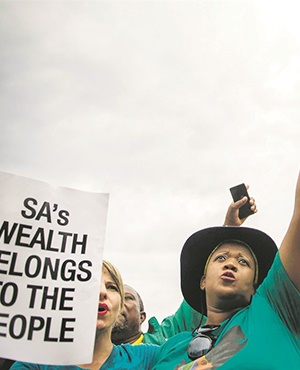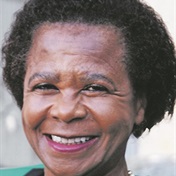
South African citizens would do well to remember that if we argue for our limitations, we get to keep them.
We have talked ourselves into believing that we have no power to shape the future of our country. It is time for change.
Our constitutional democracy puts citizens at the centre, yet we have chosen to become beholden to the games of power within the ANC as the governing party.
The media is flooded with opinions about possible outcomes of the ANC leadership contest as if it is the only determinant of the shape of the future of our country.
We need a new narrative that enables citizens to reclaim their agency as shapers of the future.
We seem to have forgotten that it was citizens across the nation who mobilised a broad-based coalition to free ourselves from the evil of apartheid.
The United Democratic Front was a demonstration of what is possible when citizens say “enough is enough”.
We are fortunate that the SA Council of Churches has woken up to its responsibilities.
Its Unburdening State Capture report, released in July, has galvanised faith-based leaders to launch a national convention process, which presents us with an opportunity to work together as citizens to reimagine, redesign and reorganise our country.
Somadoda Fikeni’s article on why African liberation movements find it difficult to transform themselves into accountable democratic political entities enables us to understand our current politics.
Over the past 23 years, the ANC has demonstrated its inability to change into a clean governing party.
What Fikeni’s analysis left out is this: Why don’t citizens seem to use the power of the vote to demand accountability from post-liberation parties?
Citizens in post-colonial countries find it difficult to transform themselves from subjects to citizens.
Our citizens allowed the rewriting of the history of our struggle to cast themselves as passive recipients of liberation delivered by the ANC.
We have acquiesced to the discounting of citizens’ roles in becoming shapers of a future characterised by participatory democracy.
While harsh exile environments have shaped the political culture of the ANC, we have been shaped into a subject people by the humiliation, dispossession and abuses of human rights by successive racist governments.
Neuroscientists have concluded that trans-generational trauma alters brain function, which can lead to depression, self-defeating responses to stress and exaggerated fight-or-flight responses.
Catalysts of change
The capacity of survivors to learn from history is often undermined.
Humiliation is particularly damaging to the capacity to develop empathy and sympathy, often leading to the descendants of those who were abused to become abusers.
History often repeats itself in this way.
The unfinished agenda of healing the wounds of the past is a prerequisite to embracing human rights values and living the ubuntu ideals.
Freeing ourselves from our subject mind-set is an essential step in building a just, open society and a participatory democracy.
As a people who have endured multiple generations of conquest, dispossession and exclusion from effective participation in the economy, we need an active programme to shift our mind-sets and reclaim our sovereignty.
Storytelling – a central feature of African culture – is an invaluable tool to the healing process that we need to commit to.
Storytelling enables us to author our own identity, as well as its journey of coming into being, so that we can be more confident in shaping our own futures.
Healing is essential to unleashing the power within us to become the shapers of the future we want to inhabit.
History teaches us that individuals are the most effective catalysts of change.
Change starts with each of us – to the extent that, individually and collectively, citizens work together to transform society; to that extent our country will realise its potential to become closer to our dream.
Transcending many centuries of colour-coding culture would be a key indicator of healing of our nation.
This requires those defined as “white” to acknowledge the benefits of historical privilege, as well as the superiority complex that justifies this privilege.
They also need to acknowledge ongoing disproportionate control over the key resources of our society.
Those defined as “black” need to acknowledge the pain, anger and shame of being treated as inferior.
They also need to confront the inferiority complex that continues to shape our fear of failure and the unprincipled solidarity of the wounded.
Citizens have a choice
I am long in the tooth enough to remember conversations of adults in my childhood during the apartheid era.
These were always in hushed tones, lest the system was listening.
Conversations were centred on how bad things were and how only a miracle would save us. There was an air of resignation to their powerlessness to shape the future.
Those defined as “white” pinned their hope for change on the possibility that “verligtes” within the National Party government would take over leadership.
These verligtes would then ease the most irritating apartheid elements to reduce the levels of anger among black people to secure stability.
Time and again, the verligtes disappointed by remaining loyal to the core of National Party policies.
Citizens who are today pinning their hopes on “progressive” elements in the ANC to get us out of the quagmire of corruption are mistaken.
The progressives have had enough opportunities to clean up the state capture mess in the ANC.
They have chosen to vote with the other side in the name of unity and stability in the ANC.
What unites the progressives and the “Zuptas” is the desire to keep the ANC in control of state resources.
Citizens have a choice.
The maturity of our democracy will be judged by the extent to which “we the people” take charge of electing the leaders we believe our country deserves.
It is also in our hands to hold leaders accountable for governing in accordance with the values of our human rights.
South Africa deserves citizens who are less obsessed with choices made by a governing party that continues to show little respect for them.
Our future depends on citizens reclaiming their sovereignty, and reimagining and rebuilding a country we can all be proud of.




 Publications
Publications
 Partners
Partners























